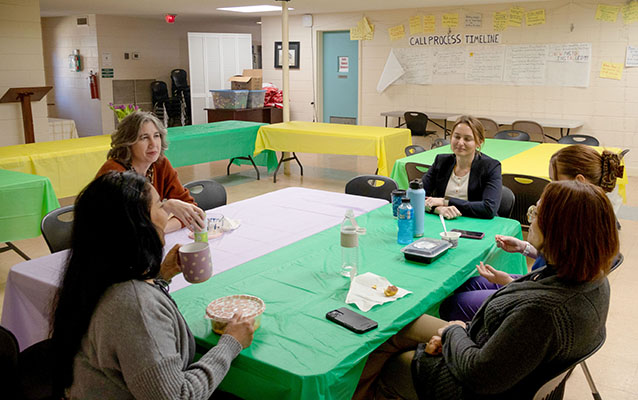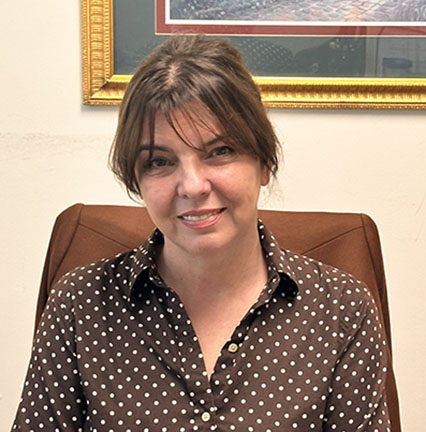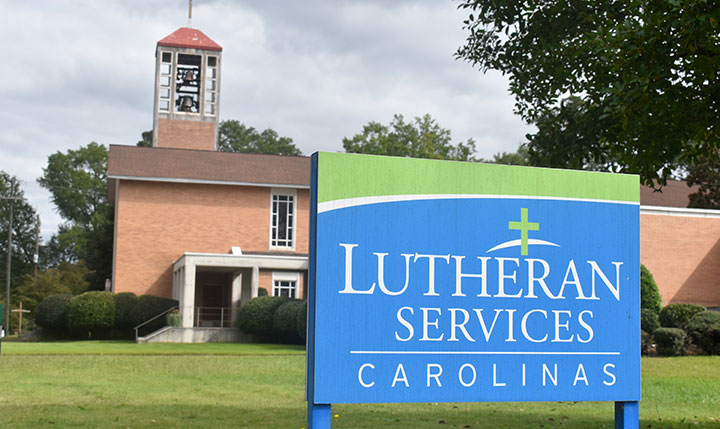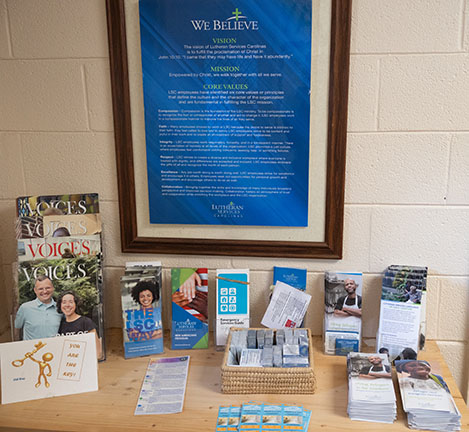Lutheran Services Carolina employees take a lunch break. The organization offers community resources to a range of clientele at four locations in South Carolina: Columbia, Charleston, Myrtle Beach and the Upstate.
Bedrija Jazic, who works with refugees and is a former refugee herself, said she has seen how one Midlands organization helps refugees become self-sufficient.
“I hear somebody calling my name, ‘Ms. Bedrija,’ yelling across the store,” Jazic said. “I turn around, and there is a refugee that we served years ago.”
The man told Jazic his family of six was able to buy a home, his eldest child was able to go to a technical college and his wife now drives a car.
“It just made my day. It showed me how much impact on their lives … the resettlement had made,” Jazic said.
Jazic is the South Carolina New Americans regional director for Lutheran Services Carolinas.
The organization has helped refugees for more than 60 years. One of its programs, the New Americans Program, helps with refugee resettlement from various countries, legal immigration and unaccompanied minors.
The United Nations helps place refugees with a country and also a program that can help them, such as the New Americans Program.
The program has helped more than 5,000 refugees in South Carolina over several decades and is hoping to expand how many people it helps in Columbia.
“We work with people from all over the world, helping them start their life over in the U.S.,” said Seth Hershberger, the organization’s resettlement director. “They are people that have gone through persecution, violence, war and torture and some horrific things. But we help them get started again here in the U.S.”
The Columbia site has taken in more than 150 people this fiscal year, which started in October, and has the capacity to help up to 350 refugees over the course of the one-year period.
The site hopes to expand its capabilities, to help up to 400 people this fiscal year, Jazic said.
The program has proposed to the U.S. Department of Health and Human Services’ Office of Refugee National Resettlement an expansion of the number of people it can help. They will be able to accomplish this with the funding that they were given at the beginning of the fiscal year.
The program is provided with a capacity number for clients and funding granted by the government. The S.C. Department of Social Services distributes these regulations to the program through the Office of Refugee Resettlement.
The organization was granted a $1,100 per capita administrative fee to pay those program expenses. The amount of money given to clients depends on the type of program they’re in.
Donations are also accepted yearlong by the organization to help fund its services and clients.
Lutheran Services Carolinas provides nursing homes, adoption assistance, foster care and other services. It also helps refugees with services that include education, career development and welfare benefits.
“They need help, but they’re not helpless, and these are ways we can work together to empower them,” said Sarah Lewis, New Americans community engagement coordinator.
The organization provides support to clients to get back on their feet and to be able to sustain themselves. The program operates from a position of empowerment rather than pity.
“If somebody wants to volunteer, sometimes they might just have in their heart only pity for a refugee,” Lewis said. “Well, it’s good to have some pity. But if you’re only operating for pity, you’re going to go some places that are not going to be helpful for either side.”
This program seeks to assist people in need, some who are escaping dangerous circumstances or have been displaced from their native countries.
The type of assistance the nonprofit offers to clients is based on their status. About 80% to 90% of their clients are in refugee status, which is given before they enter the country, Jazic said.
Status for clients can vary, as some may be granted asylum, which is a type of protection that permits someone to stay in the U.S. rather than being deported to a nation where they might face persecution or danger, according to the United Nations Refugee Agency website.
Even though refugees make up the majority of its clientele, the program also helps unaccompanied minors find homes or relatives and various clients with other legal statuses.
Jazic said she aims to promote a safe and comfortable transition for clients.
“I had an opportunity to move up and work on what I’m passionate about, and that’s building the program that serves refugees and immigrants,” Jazic said. “That’s what’s very unique about the U.S. refugee admissions program is that it is very intense, but it pushes people towards their goal.”
Jazic came to the United States from Bosnia in July 1996. After settling, Jazic worked her way from a receptionist with the program to an area manager in 2004 after initially being a volunteer. She then became the regional director in 2010.
In addition to helping Jazic and thousands of others over the years, the program has helped provide the groundwork for clients to establish stable lives in the United States.
The staff’s persistent efforts help clients navigate the several placement phases.
The initial program for new arrivals grants with direct assistance to refugees grants $1,325 per person, which is supposed to last three months. Clients in the new arrivals reception placement program are granted $2,425.
“It’s not a lot of funding, but it’s enough to at least get them on their feet until they can start working,” Hershberger said.
During the first 90 days of arrival, clients are given initial reception placement aid and core services, such as being placed in educational systems, opportunities for employment, housing, English classes or tutoring sessions, healthcare and other resources.
The program has four sites in South Carolina, including Columbia, Charleston, Myrtle Beach and the Upstate. Columbia was the first to offer services in South Carolina in 1992.
Across the state, the program has seen 437 new clients so far this fiscal year. The nonprofit has the ability to help up to 920 people statewide.
It aims to help find refugees permanent homes within 90 days of their arrival. Individuals are usually placed in the “Welcome House” upon arrival. The facility accommodates a few people at a time, and has accommodated many families year-round since 2004.
The local Lutheran’s seminary provides clientele with student housing, while the Welcome House undergoes renovations to improve conditions for clients.
Jazic also said the organization works alongside immigration attorneys to help refugees with paperwork, including for permanent residency.
Among those helped are refugees who fled Afghanistan and Ukraine.
Volunteers are often sought to provide tutoring services for clients, and the “Circle of Welcome” was established to give new arrivals a secure and welcoming environment.
This part of the program trains volunteers and team members to serve clients in a way that program staff are unable to.
This is because there are numerous clients for case managers and other staff members to manage. Professional boundaries also prevent them from forming closer personal bonds with clients to fairly assess every one.
Lewis said boundaries are an important part of being a team member, to provide a healthy relationship instead of a co-dependency for clients.
Team members give rides to doctors’ visits, introduce teachers to parents or teach public transit routines, for example.
The members put into a Welcome Circle are often paired with one family at a time. Members are advised to empower clients to promote a self-sufficient livelihood.
“These are strong, resilient folks that have endured a lot, much more difficult things than riding the bus in Columbia, or going to (the) first (day of) school in America,” Lewis said. “They’ve done a lot harder things, and so we’re coming alongside to encourage them, but also to empower them.”
The New Americans Program is always looking for willing community members to volunteer and donate. Lutheran Services Carolinas provides employment opportunities, community resources and internships.
For more information, go to https://lscarolinas.net/new-americans-program/, email them at ColumbiaNAP@Iscarolinas.net, or call 803-750-9917.
Bedrija Jazic, New Americans’ regional director and a former refugee herself, said she aims to promote a safe and comfortable transition for clients. (Photo by Shamariah Vanderhorst/Carolina News and Reporter)
The United Nations helps place refugees with a country and a program that can help them, such as the New Americans Program. (File photograph/Carolina News and Reporter)
Lutheran Services Carolina provides refugees with nursing homes, adoption assistance, foster care and other services.





